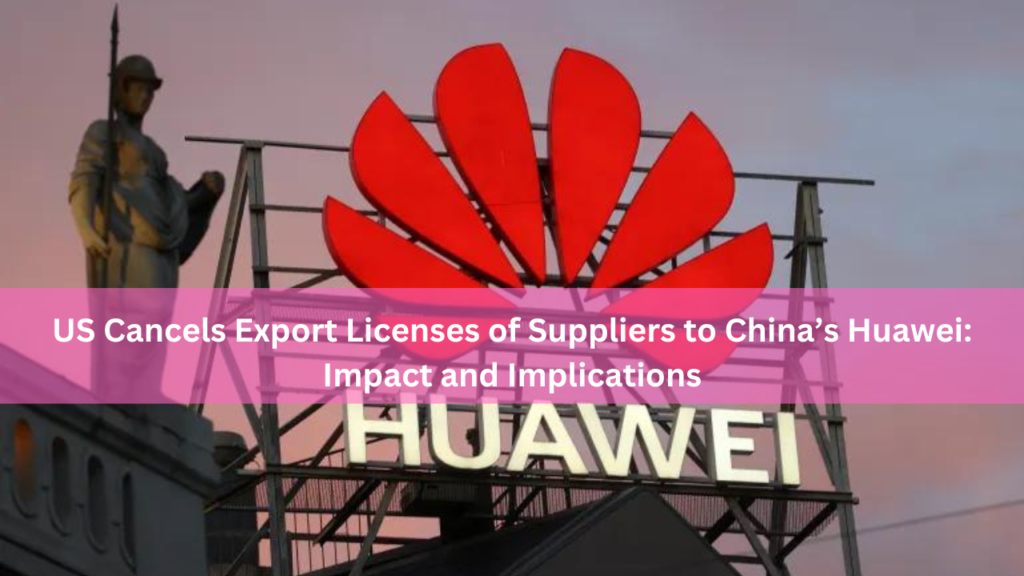The United States’ decision to revoke export licenses of providers to Huawei Technologies, a major Chinese telecommunications device maker, has sparked great debate and speculation regarding its impact and implications. Let’s delve into the details to understand the importance of this move.

Background of the Issue
Huawei has been underneath scrutiny by the US government for numerous years, by and large because of issues over potential espionage sports. In 2019, the agency became placed on a US change limit list, which required its providers to obtain unique licenses earlier than delivery goods to Huawei.
Recent Developments
The current revocation of export licenses comes on the heels of Huawei’s launch of its first AI-enabled computer, the MateBook X Pro, powered by means of Intel’s new Core Ultra 9 processor. This flow drew criticism from Republican lawmakers, who puzzled the Department of Commerce’s approval of Intel’s chip sales to Huawei.
Political Response
Republican China hawks in Congress were pushing for tougher action towards Huawei, citing national security issues. The revocation of export licenses is seen as a step in that path, geared toward safeguarding US national safety hobbies and curtailing China’s technological advancements.
Economic Implications
The decision to revoke export licenses could have enormous ramifications for both US suppliers and Huawei. Intel, one among Huawei’s key chip suppliers, should face disruptions in its commercial enterprise operations, while Huawei may also encounter challenges in sourcing vital components for its products.
From Huawei’s perspective
Huawei is yet to officially respond to the export license cancellation. But the company’s reliance on the U.S. suppliers for Intel chips and other critical components pose significant challenges to its operations and future growth prospects
Licensing review
Huawei’s licensing of suppliers has been a contentious issue, with critics saying it helped the company recover despite U.S. sanctions. imposes trade sanctions The decision to revoke certain patents reflects a shift in the government’s attitude toward Huawei and underpins U.S. trade restrictions. and China’s growing trade emphasize relationships
Qualcomm involved
Qualcomm, another major player in the semiconductor industry, is also set to supply chips to Huawei. But the end of Qualcomm’s licensing deal with Huawei and uncertainty over future chip sales could make the situation more difficult for both companies
Criticism and Commentary
Critics of the U.S. the government actions suggest that denying export licenses could have unintended consequences, such as forcing Huawei to seek new suppliers or accelerating efforts to develop indigenous technology however supporters argue that such measures are necessary to create a U.S. economy. national security interest.
Impact on the industry
The cancellation of export licenses could have devastating effects across the technology industry, affecting not only Huawei but also its competitors and suppliers. The extent of these effects remains to be seen, but they could reshape the global supply and competitive landscape.
Future Outlook
Looking ahead, the revocation of export licenses is possibly to have a ways-attaining implications for Huawei, US providers, and the wider era atmosphere. It may want to prompt a reevaluation of commercial enterprise strategies, alliances, and regulatory frameworks, with full-size ramifications for US-China relations.
Conclusion
The US choice to cancel export licenses of providers to Huawei marks a vast escalation within the ongoing tensions among the 2 countries. By concentrated on Huawei’s get right of entry to to critical technologies, the US authorities goals to bolster country wide safety and decrease China’s technological advancements. However, the whole effect of this circulate stays uncertain, and its lengthy-term effects are possibly to spread gradually.
FAQs
1. Why did the USA revoke export licenses to Huawei?
The revocation of export licenses is a part of broader efforts to shield US countrywide security pastimes and restrict Huawei’s get right of entry to to advanced technologies.
2. What are the capability effects of this move for US providers?
US providers, including Intel and Qualcomm, may want to face disruptions of their commercial enterprise operations and revenue streams due to regulations on sales to Huawei.
3. How will Huawei respond to the revocation of export licenses?
Huawei’s response stays unsure, however the employer may additionally discover opportunity suppliers or accelerate its efforts to develop indigenous technology.
4. What impact will this choice have on US-China alternate relations?
The selection ought to in addition pressure US-China change members of the family and set off a reevaluation of bilateral financial and technological cooperation.
5. What are the broader implications of this flow for the generation industry?
The revocation of export licenses should reshape the worldwide deliver chain and competitive landscape, with implications for companies and consumers worldwide.









